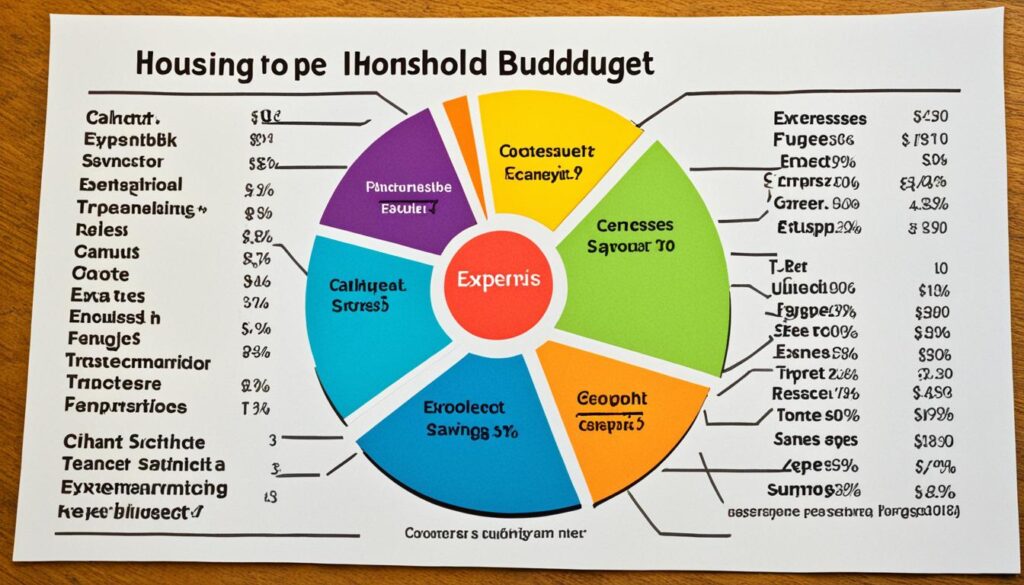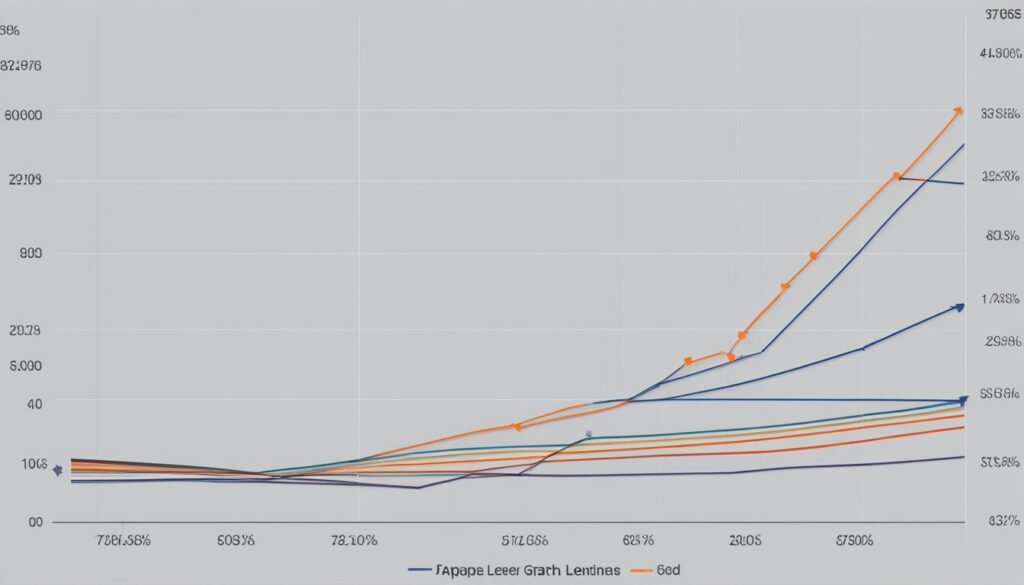Finding the right mortgage lender is key, whether you’re buying a home for the first time or refinancing. It can save you a lot of money on your loan. With countless options available, where should you start?
Having a plan before looking for a mortgage lender is crucial. Boosting your credit score, setting a budget, and knowing about loans are important. These steps not only help in getting your mortgage approved. They also help in securing the best possible rate and terms.
Remember, it’s vital to shop around when seeking a mortgage lender. Rejecting the first offer is wise. Look at offers from different lenders to ensure the best deal. Getting preapproved for a mortgage can show you what you can afford. This can make your choices clearer.
Diverse mortgage providers each have their own pros and cons. You should know what direct lenders, brokers, and other types offer. This knowledge will help you pick the best lender for your situation.
Key Takeaways:
- Strengthen your credit score, set your budget, and understand loan types and terms before searching for a mortgage lender.
- Compare rates and terms from multiple lenders to ensure you’re getting the best deal.
- Apply for mortgage preapproval to have a clear understanding of what you can afford.
- Familiarize yourself with the different types of mortgage providers available to make an informed decision.
- Shop around and compare offers from at least three lenders before making your final decision.
Strengthen Your Credit Score
Before you apply for a mortgage, check your credit score. It’s key to your loan eligibility and terms. Working on your credit history helps get better mortgage rates and payment plans.
Boosting your credit score needs a proactive strategy. Always pay your bills on time to show you’re responsible. Late payments hurt your score, so meeting deadlines is vital.
To make your credit score better, lower your credit card debt. Keeping balances under 30% is wise. This simple step can improve your score.

Don’t open new credit accounts or close old ones before your mortgage application. This can briefly lower your score, affecting your loan options.
Improving your score makes you a preferred loan candidate. A high score helps you get approved and offers better interest rates. It opens more loan choices as well.
| Actions to Improve Credit Score | Effect on Credit Score |
|---|---|
| Paying bills on time | Positive impact |
| Reducing credit card balances | Positive impact |
| Avoiding new accounts or closing old ones | Positive impact |
Getting a better credit score takes time and effort. By focusing on your credit health, you set yourself up for mortgage success. You’ll be closer to your homebuying dream with the best loan terms.
Determine Your Budget
Before searching for a mortgage lender, figuring out your budget is key. Knowing your financial situation helps you decide wisely during the home-buying journey.
First, think about your gross income. This includes all the money you make. It shows how much you can spend on mortgage payments every month.
Then, add up your current debts and monthly payments. Make sure your mortgage and other debts don’t go over 36% of your monthly income. Keeping your finances in balance is crucial.
Include all your regular bills in your budget too. Costs like utilities, gas, and childcare add up. They affect what you can afford to pay for a house monthly.
Don’t forget about possible fees and costs from lenders, and your down payment. Planning and saving for these ahead of time avoids stress later.
Creating a Detailed Budget
It’s crucial to have a detailed budget. Break down your income and expenses to see where your money goes. This helps you make changes if required.
Use budgeting software or apps to manage your money better. These can show where you might be overspending. Understanding your finances makes getting a mortgage smoother.

Setting your budget right is vital for the mortgage process. By checking your income, debt, and goals, you’re ready to choose a mortgage that’s right for you. This ensures your financial health as you buy a home.
Know Your Mortgage Options
Choosing the right mortgage is vital. You need to know about different types, terms, rates, and loan options. This knowledge will ensure your choice fits your financial goals and needs.
Mortgage Types
When thinking about mortgages, you have several options:
- Conventional Loans
- USDA Loans
- VA Loans
- FHA Loans
- Jumbo Loans
Each mortgage type has specific requirements and perks. It’s crucial to choose one that matches your situation well.
Loan Term and Interest Rate
Don’t forget about loan terms and interest rates. They’re key aspects when selecting a mortgage.
- Loan term is how long you have to pay back. Longer terms mean lower monthly payments but more interest over time.
- Interest rates can be fixed or adjustable. Fixed rates stay the same, offering stability. Adjustable rates change with the market.
Think about your financial plan and how much risk you are willing to take. This helps you choose between fixed or adjustable rates.
Loan Type
Think about what loan type you need. For example:
- If you’re buying your first home and don’t have a lot saved, consider an FHA loan.
- Veterans and service members might find VA loans beneficial due to their good terms and lower down payments.
- A USDA loan is great for homes in rural areas.
- Jumbo loans work well for high-priced properties.
Consider your financial standing, what you aim to achieve, and whether you meet the loan’s requirements. This will help you choose wisely.
Understanding all your mortgage choices is key. It includes knowing about types, terms, rates, and options. This understanding guides you to a choice aligned with your financial aspirations, making the homebuying process smoother.
Compare Rates and Terms
Looking for a mortgage involves comparing what different lenders offer. You want to find the best deal for your situation. Here are key things to look at:
- Mortgage Rates: Look at the interest rates various lenders offer. Lower rates can save you a lot over time.
- Loan Terms: Check the loan terms each lender provides. This includes how long the loan lasts (like 15, 20, or 30 years) and the type of interest rate you get.
- Annual Percentage Rate (APR): The APR shows the full cost of the loan, including fees. This gives you a more detailed picture of the loan’s total cost.
- Closing Costs: Think about the closing costs you’ll have to pay. These costs cover things like origination and appraisal fees. Title search and insurance fees are also included.
Don’t forget to look at other fees, down payment needs, mortgage points, and insurance options. Considering these will help you pick the best lender for your mortgage.

Shopping Around and Credit Score Impact
Many worry that comparing rates will hurt their credit score. But, if you check rates within 45 days, it’s seen as one inquiry. This won’t damage your credit much.
Example: Mortgage Lender Comparison Table
| Lender | Interest Rate | Loan Term | APR | Closing Costs |
|---|---|---|---|---|
| ABC Mortgage | 3.25% | 30 years | 3.45% | $8,000 |
| XYZ Bank | 3.10% | 30 years | 3.30% | $7,500 |
| 123 Lending | 3.35% | 30 years | 3.55% | $7,000 |
Table: An example of how mortgage rates, terms, APR, and closing costs from different lenders can vary. Remember, these are just to show how the comparison works and don’t represent current offers.
Get Preapproved for a Mortgage
Getting preapproved for a mortgage loan is a key first step in buying a home. It lets you know how much you can borrow. It also shows sellers your serious interest and that you’re ready to buy.
To start, a lender will check your credit, income, and finance background. You have to gather certain documents to support your mortgage application. These include things like photo IDs, pay stubs, tax returns, and more.
- Photo IDs: You need a valid government photo ID, like a driver’s license or passport.
- Pay Stubs: Give them your recent pay slips from the last 30 days to show your job and income are stable.
- Tax Returns: Hand over your last two years’ federal tax returns, with all the schedules and attachments.
- Financial Account Statements: Include statements of your bank and retirement accounts, and any other financial assets.
- Debt Payment Details: Also, share details on money you owe, like credit cards and loans, to check your debt levels.
- Employment History: Write down your job history, both current and past. Include how long you worked at each place.
- Down Payment Information: Tell where your down payment money comes from. This could be personal savings, a gift, or another legally acceptable source.
You then hand these documents over to the lender with your application. They review your financial stuff and credit to figure out the mortgage amount you can get. This review looks at your credit score, income, debt compared to income, and down payment size.

Mortgage preapproval doesn’t mean you’ve got the loan. But it’s an important step that sets your budget and lets you pick a home more wisely. It helps you know what you can afford.
Apply with a few lenders to look at what they offer in detail. That way, you can choose the mortgage that’s best for your situation and goals.
Read the Loan Estimate
After you apply for a mortgage, the lender must give you a loan estimate within three days. This document shows you the loan terms. It’s vital to go over it to understand what you’re agreeing to.
As you look through the loan estimate, focus on these key points:
- Interest Rate: Note the interest rate in the loan estimate. It tells you the cost of borrowing money and what you’ll pay each month.
- Repayment Term: The document will say how long you have to pay back the loan. Think about if this time frame fits your budget and goals.
- Fees: Pay close attention to the fees. You might see charges for starting the loan, checking your qualifications, getting your property’s value, and other costs.
- Potential Balloon Payments: Be aware of balloon payments. They are big payments due at the end of some loans. Find out if your loan includes this.
Also, look at expenses not immediately related to the loan. These could be for insurance on the title, checking the property’s value, and legally recording the loan. Costs for these things can change. So, it’s key to know what these fees are for.
If anything in the loan estimate seems unclear, reach out to the loan officer or broker. They can explain things. They can also make sure you know everything you need to about the loan.
The loan estimate is full of useful details. Make sure to read it all and ask any questions you have. This is important before you move forward with getting the loan.
Types of Mortgage Lenders
When you want a mortgage, you can turn to various types of lenders. Knowing the differences can help you pick the right one for your situation. We’ll look at six main types:
- Direct Lenders: Banks, credit unions, and online mortgage companies fall under this category. They work with the borrowers directly. This direct approach can mean better rates and service, making it simpler to get your loan.
- Wholesale Lenders: Wholesale lenders work with mortgage brokers. They provide a broader range of loans. Their process to approve loans is often quicker, which is good news for borrowers needing loans.
- Correspondent Lenders: These lenders are like wholesale lenders but with a twist. They provide the funds and then sell the loans to others. By doing this, they get more money to lend again. They keep the ball rolling in the mortgage world.
- Hard Money Lenders: Backed by private investors, hard money lenders offer alternative loans. These loans usually have higher rates and shorter terms. They can be a choice for those finding it hard to get a traditional loan.
- Mortgage Brokers: Acting as the middlemen, mortgage brokers help find the best loan. They work with many lenders to do this. For people wanting lots of loan options, mortgage brokers are a great help.
- Portfolio Lenders: These lenders keep and fund their loans. They don’t sell them off. This gives them more room to change up their loan rules. They might fit where other lenders can’t.
Comparing Mortgage Lender Types
Every mortgage lender type offers something unique. A clear comparison will help you choose wisely. Here’s a quick overview to assist with your decision:
Table: Comparison of Mortgage Lender Types
| Mortgage Lender Type | Advantages | Considerations |
|———————-|————|—————-|
| Direct Lenders | Competitive rates, personalized service | Limited loan options |
| Wholesale Lenders | Wide range of loan options, streamlined approval process | Works through mortgage brokers |
| Correspondent Lenders | Continual loan origination, access to secondary market funding | Loans sold on the secondary market |
| Hard Money Lenders | Quick financing, flexible eligibility requirements | Higher interest rates, shorter repayment terms |
| Mortgage Brokers | Access to multiple lenders, loan comparison | Commission-based fees |
| Portfolio Lenders | Greater flexibility in loan terms, eligibility requirements | Limited availability, potentially stricter lending criteria |
Learning about different mortgage lender types and what each brings helps you decide. Tailor your choice to what works best for your financial needs and goals.
Where Can You Get a Mortgage?
There are many places to get a mortgage. Let’s look at some options you might like:
- Banks: Banks are a classic choice. They have many mortgage types. Plus, they offer help all the way through your application.
- Credit Unions: Credit unions are friendly and might have special deals for members. If you’ve joined one, check out what they offer.
- Mortgage Brokers: Brokers are the middlemen. They connect you with various lenders. This saves you the hassle of finding loans yourself.
- Nonbank Lenders: Nonbank lenders, often online, focus on mortgages. They might be easier if you prefer to do things on the web. They could also be more flexible with your credit history.
When picking a mortgage source, think about what you want and need. Compare their rates, terms, and what their customers say to find the best fit.
Why Choose a Bank for Your Mortgage?
There are good reasons to choose a bank for your mortgage. Here are a few key ones:
- Familiarity and Trust: Banks we already use can feel like the right choice for many. Our trust in them and their know-how matter a lot.
- Wide Range of Options: Banks have lots of loan types. This lets you pick what’s just right for your money plan.
- In-Person Service: Meeting with your bank’s loan officer can be a big help. This is great for folks who like a personal touch.
The best mortgage source is all about what works best for you personally. Think about what you need most, like easy service or better loan offers, to choose wisely.
Comparison Table: Mortgage Lender Options
| Lender Type | Advantages |
|---|---|
| Banks |
|
| Credit Unions |
|
| Mortgage Brokers |
|
| Nonbank Lenders |
|
Conclusion
When looking for the best mortgage lender, do your research well. Boost your credit score and set a real budget. Knowing your mortgage choices helps you decide wisely.
Study the loan estimate really well to understand its costs. Getting preapproved by several lenders shows you what you might get.
Think about what different lenders offer and pick one that meets your needs. With these tips and careful research, you can find the right mortgage lender. This will help you get a loan that fits your finances and future goals well.
FAQ
How do I choose the best mortgage lender?
To pick the best mortgage lender, do your research. Compare the rates and terms they offer. Know your finances well.
Improving your credit score and setting a budget are important steps. It’s also good to read the loan terms carefully. Getting preapproved is vital too. This way, you can choose the best lender for you and get a loan that suits your needs and wallet.
How can I strengthen my credit score?
To build your credit score for a mortgage, start by paying your bills on time. Lower credit card debts. Avoid opening new credit accounts or closing old ones.
Check your credit report for any mistakes. Fixing these can help improve your score. A strong credit score means a better mortgage deal.
How do I determine my budget for a mortgage?
Before starting to look for a lender, figure out your budget. Take into account your total income and current debts.
Remember your regular bills like utilities and how much you spend on things like daycare. Include possible extra costs like fees and the down payment. Keep your mortgage payments and other debts to less than 36% of your income.
What are my mortgage options?
You have several mortgage types to choose from. This includes conventional, USDA, VA, FHA, and jumbo loans. Think about the loan’s term, the interest rate, and the type of loan it is.
Longer loans mean lower monthly payments but higher total costs. Fixed-rate mortgages maintain the same interest rate. Adjustable-rate mortgages’ rates can change. Pick the one that fits your financial situation best.
How important is it to compare rates and terms from different mortgage lenders?
Comparing what different lenders offer is key to finding the best mortgage. Look at key details and fees, including the APR.
Remember, checking out multiple lenders quickly doesn’t hurt your credit score. They’ll only count as one if done in a 45-day period.
Why should I get preapproved for a mortgage?
Getting preapproved with several lenders shows you what loan amounts you can get. It involves a deep look at your credit and finances.
You’ll need to give documents like IDs and income information. This step helps you know your budget for sure. It’s a great first step before house hunting.
What should I look for in the loan estimate?
Within three days of applying, lenders give you a loan estimate. It’s important to understand this document. Focus on the interest rate, repayment rules, and all fees.
Don’t forget about extra costs like insurance or appraisals. Make sure to compare similar loan offers. Ask questions if some parts are not clear.
What are the different types of mortgage lenders?
There are direct lenders, wholesale lenders, and more. Direct lenders offer great rates and personal service.
Wholesale lenders go through mortgage brokers for easier approvals. Each type has its own benefits. Choose based on what matters most to you.
Where can I get a mortgage?
You can get a mortgage from banks, credit unions, and more. Banks and credit unions are good for personal service.
Nonbank lenders, including online options, may be flexible with credit scores. Mortgage brokers help you find the right lender. Think about what you prefer and what fits your needs.



















